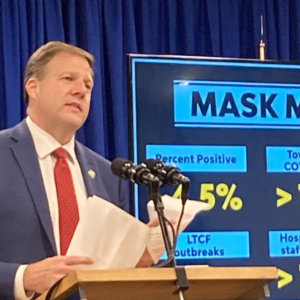Gov. Chris Sununu announced Tuesday the state is setting aside $10 million for taxpayer-funded bonuses to unemployed Granite Staters who get off unemployment and go back to work. But when it comes to vaccine incentives, the Republican governor’s number is still zero.
Sununu noted there are more unfilled jobs than at any time in state history. “Everyone is looking to hire. Wages are starting at $15 or $20 an hour. This is an awesome opportunity for our citizens to get back to work,” he said at his weekly COVID-19 presser. “Every employer I talk to is looking for workers. They’re desperate for not just the $300 to go away, which it will as soon as it can on June 19, but also now, we’re kind of reversing course a little bit in a positive way and adding a stipend — an incentive — to get folks back to work.”
As a result, he’s going to use the $10 million to pay $500 to part-time workers and $1,000 to full-time workers who are currently unemployed but stay on the job for at least eight weeks.
Ending the federal unemployment payments is a new position for the Republican governor. Two weeks ago, he told NHJournal he supported keeping the money flowing due to the state’s low unemployment rate. “If we had a high number of individuals on unemployment, that would potentially be a different story, but we have one of the lowest unemployment rates in the country which means one of the smallest number of people taking advantage of the unemployment system, which is great,” Sununu.
On Tuesday, Sununu used the same low jobless numbers as part of the reason he’s killing the federal checks and offering “summer stipend” checks, as he called them.
Now, Sununu’s ready to pay up — for workers, that is. Not to incentivize reluctant Granite Staters to get vaccinated and take New Hampshire closer to herd immunity. Asked about incentives offered in other states — ranging from free beer, to laps around a race track, to giving five people the chance to win $1 million — Sununu dismissed these efforts.
“If I have $5 million, I’m spending it on getting people back to work,” Sununu said of the Ohio lottery incentive.
But what’s the difference? Filling jobs is an important public policy goal, but isn’t achieving herd immunity at least as important? Why use money to incentivize one but not the other, WMUR’s Adam Sexton asked the governor.
“Because getting a shot is a healthcare decision. That’s a very personal, long-term decision,” Sununu said. “And if folks, for whatever reason, don’t feel comfortable or safe, you don’t want to be offering — I don’t want to use the word ‘bribe’ — but that cash, if you will, to do something that they inherently at their core might not feel comfortable with. And we just have to respect that.”
But Sununu was OK with “giving people a nudge” to get off unemployment and get a job, “especially given the need [for workers] is so high right now to get our economy on track.”
The Granite State remains one of the top-performing states when it comes to getting citizens vaccinated, currently ranked 4th in the nation for highest percentage of population with at least one shot. However, after an early surge of demand, vaccinations have fallen to a trickle among adults. In mid-April, the state was averaging close to 28,000 vaccines a day. The state didn’t give out that many over the past week, despite just 38 percent of the state being fully vaccinated.
Still, Sununu says he’s not open to significant incentives.
“Look, the vaccine is safe. It works. There’s no doubt, but we just have to appreciate that a lot of folks just don’t feel comfortable with it from there, their health and safety of their own body,” Sununu said.





